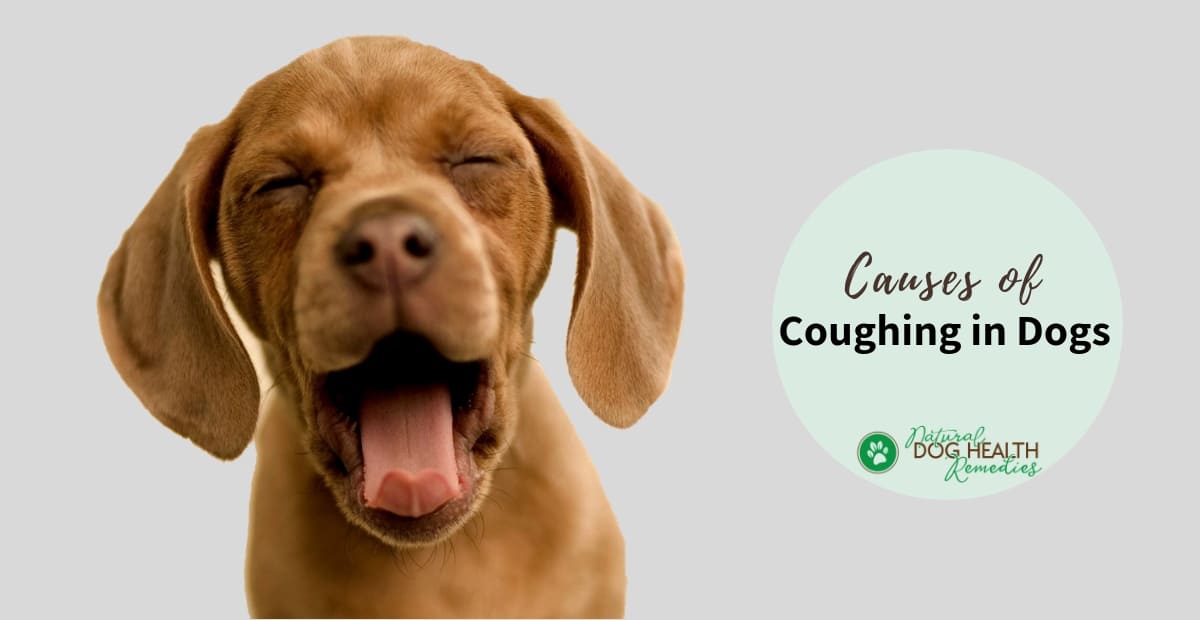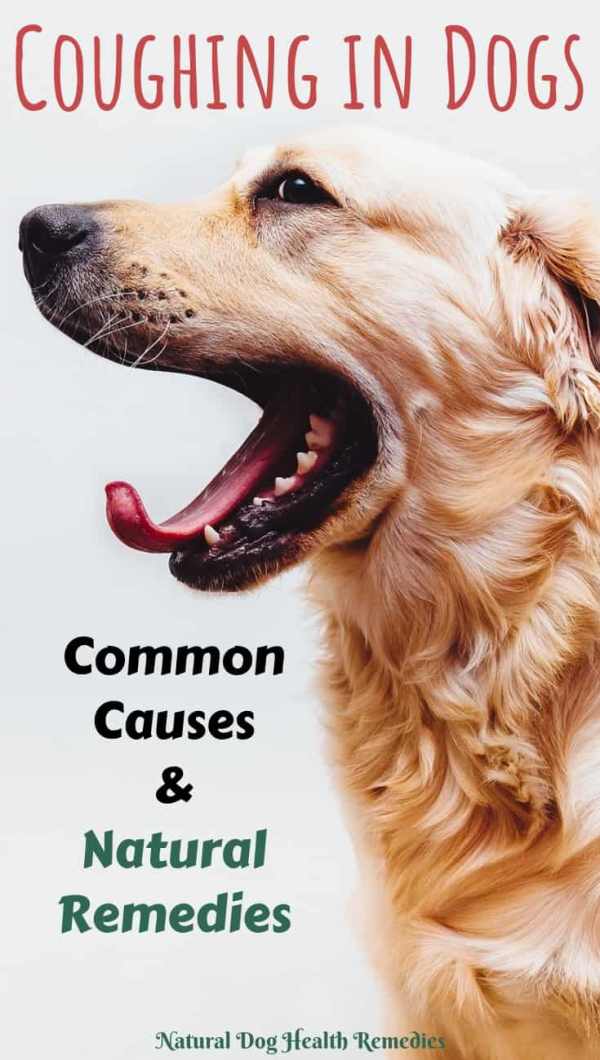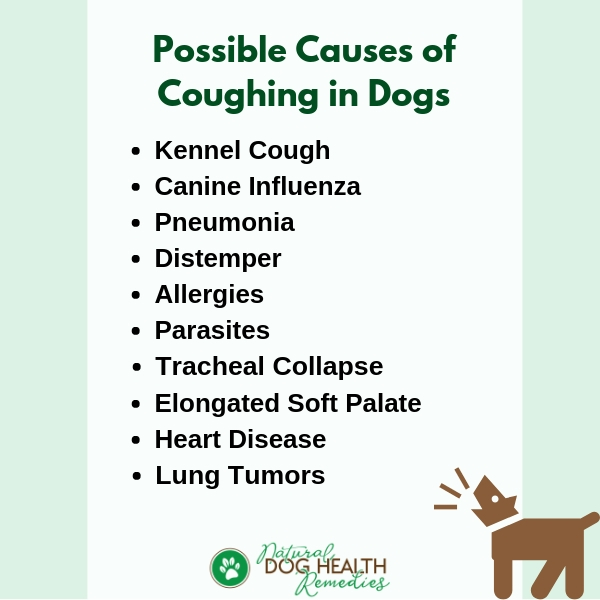Top Causes of Coughing in Dogs

Overview
Similar to sneezing, coughing is a way for the body to get rid of foreign particles and infectious bacteria from the respiratory tract.
Sometimes mucus may be produced to bind the foreign particles and prevent them from moving deeper into the lungs, resulting in a "moist cough".
There are a number of possible reasons that may cause coughing in dogs, some are more serious than others.
With that in mind, if your dog is coughing, especially if the cough is severe and chronic, be sure to take her to a vet for a thorough check-up.
What Causes Dog Coughing?
Here is a list of some possible causes of coughing in dogs:
Kennel Cough
If your dog has deep, dry, hacking coughs, but is otherwise fine, she may have contracted kennel cough or acute tracheobronchitis. Most cases of kennel cough are not serious and the dog will get over the cough in 1 to 2 weeks.
You can find more detailed information from this page on Treating Kennel Cough.
Canine Influenza
Dogs infected with influenza will show signs of upper respiratory problems such as coughing, sneezing and runny nose. Canine influenza can also cause a dog to have a fever, sometimes as high as 106°F.
Usually, dogs infected with the flu will recover without treatment.
For dogs with more serious symptoms, supportive treatment such as fluid therapy and cough suppressants may be needed.
Canine Pneumonia
Pneumonia also causes coughing in dogs, amongst other symptoms. The cough is usually a moist, bubbling one, which indicates fluid or phlegm in the lungs.
Pneumonia can be a result of an infection, or secondary to other conditions, such as allergies, aspiration of liquid, or heart failure.
Pneumonia is a serious illness, so if you suspect your dog's coughing is caused by pneumonia, be sure to take the dog to the vet immediately.
Distemper
Distemper is a contagious viral disease that can cause serious health problems to dogs, especially puppies.
The first sign of distemper is a dry hacking cough, accompanied by a fever of 103° to 105°. A thick, yellow discharge from the nose and eyes is also common.
But if your dog is routinely vaccinated against distemper, there is little chance for her to get infected.
Allergies
Dogs with inhalant allergies sometimes may have a "moist cough". This is a way for the body to get rid of the irritants or allergens (e.g. pollen, cigarette smoke, etc.) that may have entered the respiratory tract.
Usually the dog may stop coughing once she is removed from the source of the allergen.
Parasites
Another common cause of coughing in dogs is internal parasites such as roundworms, hookworms, and heartworms.
Larvae of intestinal parasites such as roundworms and hookworms can trigger coughing (called a verminous cough) when they migrate up the intestine into the respiratory tract.
Heartworms also cause coughing when the immature heartworms are transferred to the dog's circulatory system by an infected mosquito.
The parasites migrate into the lungs, causing the dog to cough (a dry to moderately moist cough) which usually gets worse when the dog is lying down. Heartworm infection is potentially life-threatening so prevention is essential if your dog lives in an area where mosquitoes are plentiful.
Tracheal Collapse
 Dogs that are overweight, old, or have suffered neck injuries, as well as toy breeds of dogs (e.g. chihuahua, pomeranian) are prone to tracheal collapse.
Dogs that are overweight, old, or have suffered neck injuries, as well as toy breeds of dogs (e.g. chihuahua, pomeranian) are prone to tracheal collapse.
This condition is basically a narrowing of the windpipe due to the weakening of the cartilage, which forms and supports the trachea. The collapse causes inflammation of the membranes, which are lining the trachea. This results in a dry, hacking cough.
Besides the cough, dogs suffering from tracheal collapse show symptoms like harsh breathing and gagging. The cough is worsened by exercise, heat, excitement, and humidity. Obese dogs are particularly vulnerable to this condition.
Treatment consists of managing the cough and using supplements to strengthen cartilage. In particular, use a supplement with glucosamine to help keep the lining of the airway in a healthy, moist state. To protect your dog's throat and keep pressure off the airway, use a harness instead of a collar.
In serious cases, surgery may be needed.
Characteristics of Some Dog Breeds
Brachycephalic dogs (dogs with "pushed-in" faces such as pugs, bulldogs, Pekingese, etc.) that snore often suffer from a condition called "elongated soft palate".
It means that the soft palate at the back of the throat is too long and it protrudes into the airway, causing not only respiratory problems but sometimes coughing as well. This condition is treated using medications and sometimes surgery.
Heart Disease
Dogs suffering from heart disease, such as congestive heart failure, can develop coughing as well.
The coughing is caused by the enlarged heart, which compresses the airway, resulting in dry, unproductive coughing bouts, especially at night or while lying on the sternum.
Lung Tumors
Sometimes, coughing in dogs may mean something more serious.
For example, it is common for dogs with lung tumors to have dry, hacking coughs. When the cancer is in its advanced stage, the coughs may produce small amounts of phlegm or blood.
Primary lung tumors are rare. Most cases of lung tumors are a result of metastasis (the spreading of cancerous cells from other parts of the body).

Things to Look Out For in a Coughing Dog
If your dog is coughing, try to observe her carefully and note down answers to the following:
- Is the cough an isolated incident or does it happen regularly?
- Is the cough moist or dry?
- Does the cough produce anything - mucus, blood, pus?
- Does the dog cough most when she is up and active or when she is lying down?
- Is the dog active, or lethargic?
- Is breathing hindered?
- Are the gums pink and healthy, or are they dark or bluish?
You should also try to determine the patterns and circumstances of the coughing bouts (to help your vet make an accurate diagnosis). For example,
- Are the coughing bouts triggered by certain conditions, such as:
* air pollution;
* after or during drinking water;
* change in temperature - going out into the cold air, or entering a warm room;
* change in humidity? - What time of day or night do the coughing bouts occur?
- If there are other pets in the house, are they also affected?
When to See a Vet
Take your dog to the vet immediately if you notice the following:
- the dog's breathing is hindered;
- she is very weak and lethargic;
- her gums are not pink;
- she has a moist cough and is coughing up mucus, blood or pus;
- the coughing is severe, or each coughing spell lasts more than a few minutes.

Important!
If your dog has a chronic cough and, in particular, if there are other accompanying symptoms that cause you to suspect that the cough is caused by some deeper underlying condition, take the dog to the vet for a proper diagnosis.
As mentioned above, since chronic cough may be caused by serious health conditions that can be life-threatening, dog coughing should not be taken lightly.
How To Treat Coughing in Dogs
Since coughing is an illness symptom, it is important to find out the underlying cause. Once that's diagnosed, treating or managing the underlying cause will hopefully eliminate the coughing.
In the meantime, while the dog is being treated for the underlying cause, it's possible to use natural remedies to ease the cough so the dog can feel better.
Be sure to read our article on Home Remedies for Dog Cough for suggestions on some natural home remedies that are effective in easing your dog's cough.
ReferencesEldredge, et al. Dog Owner's Home Veterinary Handbook 4th edition (Wiley Publishing, 2007).
C.J. Puotinen, Natural Remedies for Dogs and Cats (Keats Publishing, 1999).
M. Goldstein, The Nature of Animal Healing (Ballantine Books, 2000).
R.H. Pitcairn, The Complete Guide to Natural Health for Dogs and Cats (Rodale, 2005).





